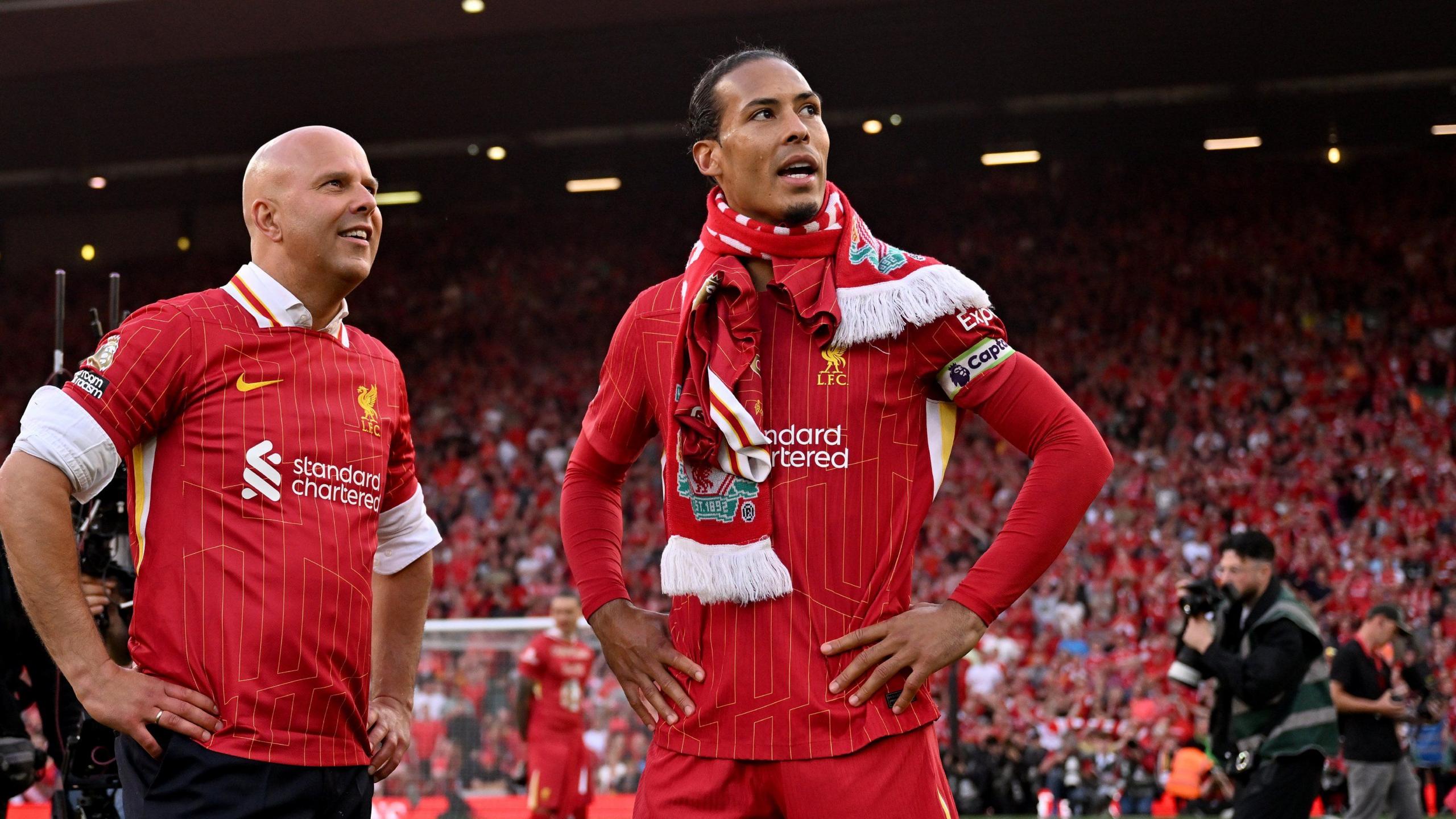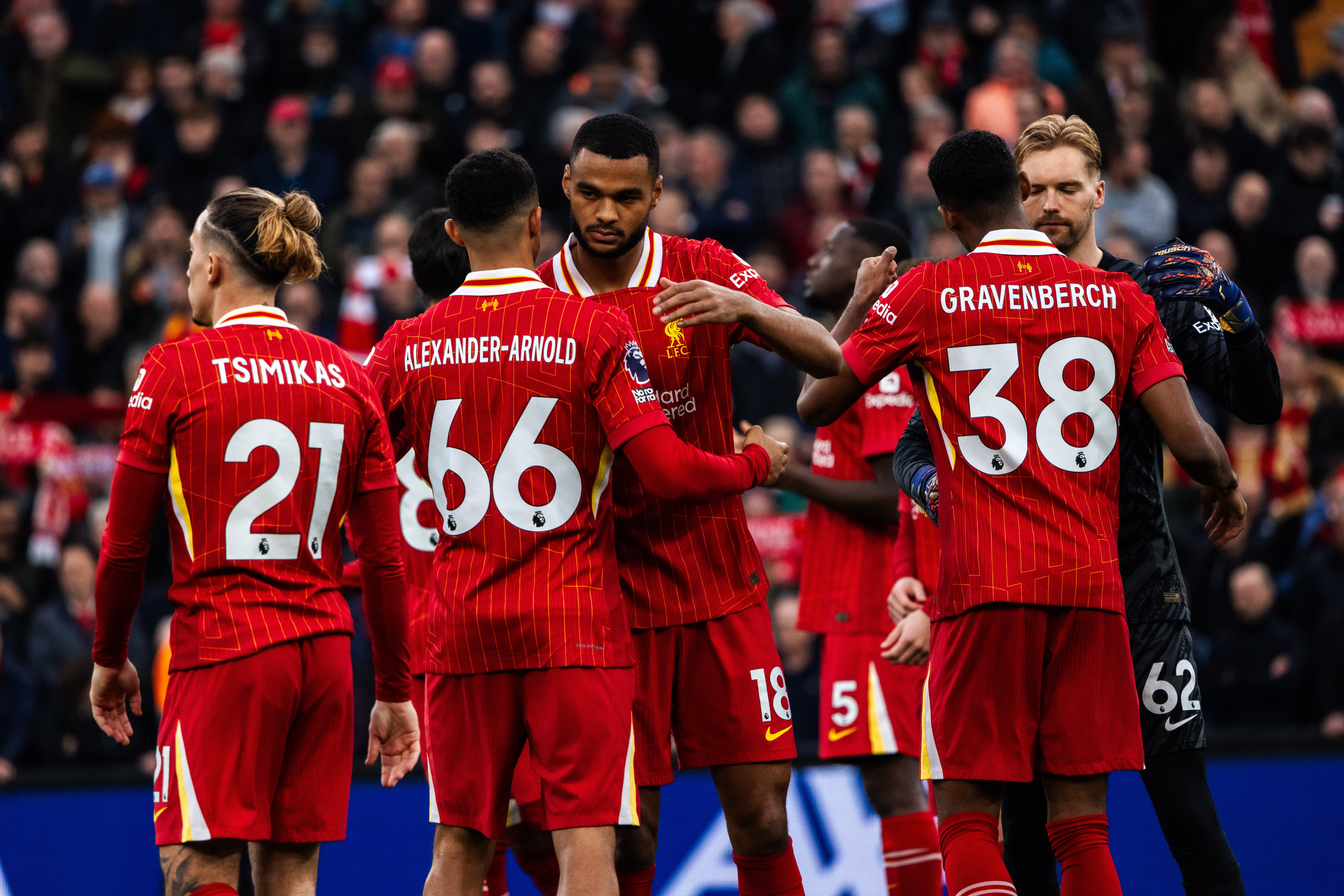Liverpool, renowned for its rich football heritage and passionate fanbase, finds itself at a pivotal crossroads as it prepares for the upcoming season. Despite recent investments and a talented core, concerns about the squad depth—have emerged, casting doubt on their ability to compete consistently across multiple competitions. As Liverpool gears up for the EPL 2025-2026, it’s crucial to analyze the current strengths, weaknesses, and strategic challenges that will shape their journey ahead.
Liverpool

Liverpool Football Club stands tall among Europe’s elite, celebrated for its illustrious history, innovative tactics, and dedicated supporters. Over the years, the club has built a reputation for resilience and attacking prowess, often thriving in high-stakes moments. However, recent seasons have exposed vulnerabilities, particularly regarding squad depth, which could hinder their ambitions in future campaigns.
The club’s management has been aggressive in the transfer market, trying to reinforce weak spots and prepare for the relentless fixtures of the Premier League and European tournaments. Nonetheless, criticisms have arisen over whether these investments have adequately addressed squad depth, especially in physically demanding competitions. The failure to secure a convincing backup for key players or to develop a balanced bench might prove costly as injuries, fatigue, and tactical adjustments come into play.
Looking ahead, Liverpool must balance their nostalgic success with pragmatic strategies to bolster their line-up. Building a squad with versatility, resilience, and genuine depth could be the difference between a title challenge and falling short in crucial moments.
Legacy and Recent Form
Liverpool‘s history is decorated with league titles, Champions League victories, and domestic cups, all rooted in a philosophy blending aggressive pressing with creative attacking. Under Jurgen Klopp, the club has revitalized its identity, emphasizing high-pressing football and youth development.
Yet, in recent seasons, inconsistency and injuries have tested the team’s resilience. The infamous injury crisis during the 2023-2024 season illuminated the vulnerabilities stemming from insufficient squad depth. When several first-team players were sidelined simultaneously, the team struggled to maintain results, particularly in away fixtures and European contests. These setbacks underscore the necessity for further squad strengthening to sustain high performance levels across multiple fronts.
The Urgency of Strategic Investment
Despite a sizable transfer expenditure—reportedly around 293 million euros—the question remains whether Liverpool‘s strategy has been sufficiently comprehensive. The club has purchased players across various positions, aiming to develop a competitive edge, but the exit of several squad members has created gaps.
The challenge now lies in quality over quantity. It isn’t just about signing more players; it’s about signing the right players—those who can slot into various tactical systems and provide depth without compromising team chemistry. Liverpool‘s management needs to prioritize versatile players capable of filling multiple roles, thereby increasing squad depth and ensuring they can adapt to unpredictable situations in the upcoming season.
Fan Expectations and Media Scrutiny
Fans and media closely watch Liverpool, particularly amidst doubts about their squad depth. Expectations remain high—anything short of challenging for the Premier League title or deep runs in European competitions is viewed as a disappointment. The narrative emphasizes whether Liverpool’s current squad can withstand the rigors of a grueling season.
In this context, the club faces external pressure to reinforce their squad further before the transfer window closes. The internal dynamics—such as locker room harmony, tactical flexibility, and injury management—are all influenced by the depth of the squad. Without strategic reinforcements, the risk of burnout and underperformance looms large.
Squad depth

The concept of squad depth—is pivotal in modern football. It encompasses not only the number of players available but also their quality, versatility, and ability to step in under various circumstances. A well-balanced squad allows a team to rotate players, manage injuries, and adapt tactically, ultimately providing stability and sustained competitiveness throughout a long season.
Liverpool’s recent performances have highlighted both strengths and deficiencies within this realm. While their starting eleven often showcases talent and tactical intelligence, the bench remains a concern—particularly in high-stakes games where injuries or suspensions force tactical shifts. Analyzed thoroughly, issues surrounding squad depth can be categorized into defensive resilience, attacking options, and midfield support, with each having distinct implications.
Defensive Resilience and Backup Options
Liverpool boasts a formidable central defense, with Van Dijk and Konaté anchoring the backline. However, the lack of quality backup defenders creates vulnerabilities. If either key defender sustains an injury or faces suspension, the team is forced to either deploy a less experienced player or adjust their tactical system—a risk that could be exploited by opponents.
Furthermore, the depth of full-back options remains somewhat limited. Although Trent Alexander-Arnold and Andrew Robertson provide offensive and defensive stability, replacements of similar quality are scarce. This lack of depth could compromise both defensive solidity and attacking overlaps—two essential elements for Klopp’s high-intensity style.
Attacking Weaponry and Goal Threats
Despite having key attackers like Darwin Nunez and Mohamed Salah, Liverpool’s frontline faces challenges when rotation options are limited. The departure of certain squad members has left gaps, and the single signing of a new striker raises questions about capacity to endure a rigorous campaign.
Without capable backup strikers or versatile attacking midfielders, the team risks over-relying on a handful of players. This exhaustion could lead to dips in performance, especially in the second half of matches or during congested fixture periods. Strengthening attack options is vital to maintaining goal threats and tactical flexibility.
Midfield Strength and Versatility
Liverpool’s midfield boasts a mix of seasoned players and energetic youth, with talents like Fabinho and Elliott. However, the absence of a truly multi-dimensional midfielder—capable of both defending and creating—limits tactical options. Injuries to key midfielders could see Klopp adjusting formations, but without adequate depth, such changes might weaken their overall control of games.
Diverse midfield assets—players who excel both offensively and defensively—are crucial for a team aiming to dominate possession and transition swiftly. Expanding the squad with versatile talents could provide Liverpool with more tactical flexibility and resilience in vital moments.
Strategies to Enhance Squad Depth
To fortify their squad depth, Liverpool should focus on several strategic areas:
- Prioritize signing versatile players capable of occupying multiple roles.
- Develop youth players to integrate seamlessly into the main squad, reducing dependency on external signings.
- Use tactical flexibility to maximize existing squad potential and cover multiple scenarios.
- Invest in medical and fitness infrastructure to minimize injury impact and enhance player durability.
Addressing these structural aspects consciously can transition Liverpool from a team reliant on key individuals to a resilient squad capable of handling the demands of the EPL 2025-2026.
The EPL 2025-2026

The upcoming Premier League season represents a significant challenge for Liverpool. The EPL 2025-2026 will test the club’s strategic planning, squad depth, and adaptability amid fierce competition from rivals like Manchester City, Chelsea, and Arsenal.
Liverpool has always celebrated a meticulous approach—balancing attacking football with disciplined defense. However, the weight of multiple competitions necessitates a squad prepared for the grind, injuries, and fatigue. As the calendar tightens, the importance of squad depth becomes even more apparent, impacting match-day selections and tactical flexibility.
Expectations and Realities
Liverpool fans expect a competitive, thrilling campaign, with aspirations of challenging for the league title and making strong European runs. Yet, realistic analysis recognizes that squad depth limitations could hinder these ambitions. Injuries or fatigue may force Klopp to rely heavily on a handful of stars, risking performance dips.
The club’s recent investments suggest a commitment to competing at the highest level, but meaningful depth must be built to sustain momentum in a competitive landscape. A team with insufficient backup players risks losing vital points due to squad fatigue or injuries, especially during congested fixture periods such as the holiday season and knockout stages.
Tactical Challenges and Squad Utilization
In the context of the EPL 2025-2026, tactical flexibility will be vital. Klopp’s approach—high pressing, rapid transitions—demands a physically resilient and versatile squad. If certain positions lack depth, tactical shifts become constrained, potentially exposing weaknesses against tactically astute opponents.
Managerial decisions will also play a crucial role. The ability to rotate effectively, manage player workloads, and integrate youth prospects can redefine their season trajectory. Strategic adaptations, like deploying flexible formations or employing rotation policies, could mitigate some squad depth deficiencies.
Key Focus Areas for Success
Liverpool‘s pathway to a successful campaign involves targeted focus areas:
- Enhancing bench strength for key positions—defense, midfield, and attack.
- Developing emerging talent to fill potential gaps and reduce reliance on aging or injury-prone players.
- Investing in specialized roles to provide tactical solutions for different match scenarios.
- Preparing fallback plans for unforeseen circumstances, ensuring the team remains competitive even when faced with adversity.
In addition, careful planning around transfer windows and scouting new talent that fits the club’s philosophy can provide the necessary insurance policy against setbacks.
The Role of Fan Engagement and Club Culture
A strong club culture and passionate fan support can positively influence squad morale during challenging times. As Liverpool navigates the EPL 2025-2026, maintaining high spirit, unity, and resilience will be instrumental.
The connection between the club and fans enhances collective motivation, especially when facing adversity due to squad limitations. Liverpool‘s history of overcoming setbacks can serve as inspiration for both players and supporters alike, fostering a belief that depth and resilience—when combined—can produce lasting success.
Conclusion
Liverpool‘s pursuit of excellence in the upcoming EPL 2025-2026 hinges significantly on addressing their current squad depth issues. While their core squad contains quality talent, the gaps in backup options, versatility, and squad resilience pose substantial challenges. To sustain their title ambitions and European push, strategic reinforcements and tactical flexibility are essential. The club’s ability to adapt, develop emerging talent, and implement a comprehensive squad-building philosophy will determine whether Liverpool can capitalize on their rich heritage or fall short in an increasingly competitive landscape. Success depends not only on star performers but equally on a deep, resilient squad ready to face all eventualities and continue their legacy of greatness.

